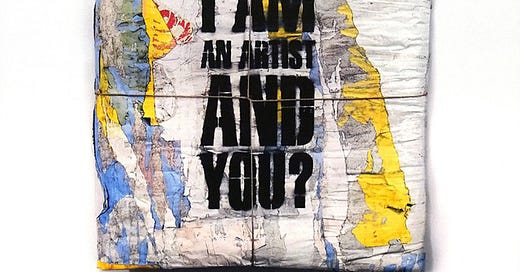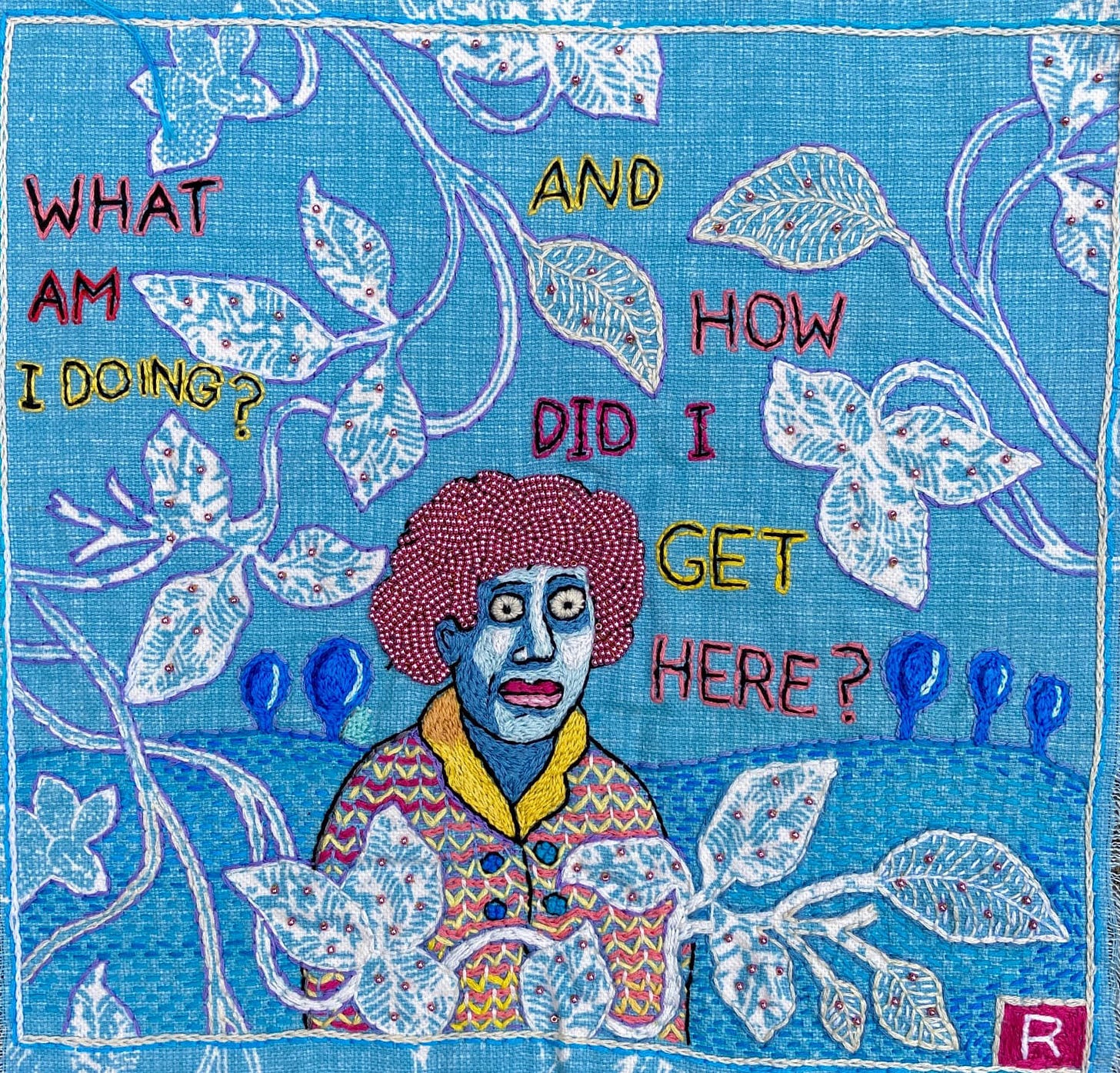I am an artist.
This may seem self-evident, because I have been making, showing, and selling art for over 20 years now. But ask a group of people who make art – some for a living, some not – whether they consider themselves artists, and it becomes clear that the question is complex. Student to artist is not a clear-cut progression like medical student to doctor. In many ways, calling yourself an artist is a statement of identity, of self-belief. Some people who make art strictly as a hobby confidently refer to themselves as artists, while others who show and sell their work do not.
I am emphatically NOT here to police the definition of artist. There are plenty of others doing that: claiming that you’re only a “real” artist if you do it full-time, if you have an MFA, if you have gallery representation, blah blah blah. That kind of exclusion is pointless and tiresome. But I’m also not here to proclaim that “if you make stuff, you’re an artist,” a definition I find too broad to be useful. I’m more interested in exploring why some serious, creative people feel comfortable calling themselves artists, and how they got there. Specifically, when they got there.
I asked an unscientific sample of working artists “at what point in your life did you consider yourself an artist?” The answers, which I am sharing here with permission, were fascinating in their variety. At first I saw no pattern in these responses, but they gradually sorted themselves into groups. (Some responses have been lightly edited for length and clarity)
Speaking for myself, I did not feel comfortable calling myself an artist until my thirties, several years after I began showing and selling my work. I was self-taught and insecure, so I would hedge: “Yeah, I’m sort of an artist.” It took many people assuring me that my work was good (and buying it) for me to gain the confidence to claim the label.
Crucially, I did not grow up thinking of myself as artistic. As a child, I was a bookworm, much more likely to become a writer than a painter (yeah, I know, fast-forward to me here and now, calling myself “sort of a writer” as I hit publish). I was never that kid in art class with the amazing drawing skills.
Some of my peers were those kids, however, and they considered themselves artists from very early ages. Here are a few of their stories:
The Youngsters
M, a painter: My first inkling was when I was about 4 years old. Later when my mom took us to the Dayton Art Institute to see a show, I knew art would be important. I was the "artist" in my family.
R, a sculptor: When I was five my mom would sit me on the seat of a bike and take me to art class. That action imprinted deep in my core that making art is important. That was over 60 years ago… I always was creating “installations” with every kind of material I could find. I was both encouraged and discouraged by my family to be an artist. Looking back, I believe how I looked at the world was foreign to their sensibilities. For a long time I did not call myself an artist; making was just part of me, not defined by words. I did study art academically. I own a small gallery, with my artist husband, in a small rural community in Wisconsin. I am in my studio every day.
L, a painter and designer: I was always drawing and recognized by my grade school classmates as the class artist. About age 10, third or fourth grade. I majored in studio arts and graduated with a BFA. I’ve worked full-time as an artist and designer for my whole career, and even with all of that, I’ve doubted myself as a true artist, because I don’t paint with oils, my work isn’t collected by museums, and I don’t show in art galleries. It’s absurd criteria that I think still exists. And very effective brainwashing.
Of course, some of the kids who knew they were artists from very young ages struggled to find their professional paths.
A, a painter: I knew I was a painter at 3 or 4 years old. I struggled with drawing and stopped trying by high school. I never went to art school, but I was intensely involved in other creative pursuits. Then I started painting at 38 years old.
The Later Bloomers
At the other end of the spectrum, there are many artists who did not allow themselves the title until they had years of creating art under their belts.
J, a collage artist: My teachers and my mother saw me as an artist starting in first grade. I never thought of it as a possible career. It wasn't until I was in my late 40s, after I had some success selling etc., that I began to see the possibility. Then we moved to a new city (husband and 4 kids) and when I filled out the forms for a new school it asked for occupation, and I wrote artist.
N, a painter and digital artist: I started learning about art after… a breakup! It was healing to my soul. And I loved it. I hated art in school and got to appreciate it in my early 30s. I still consider myself an art trainee as I learn from others as I age! Art sales help me keep going.
A, a sculptor: Despite going to art school in my late teens, I didn't identify as an artist for a long time. It wasn't until after my MFA thesis show, in my early 30s, that I was able to say, "I am an artist." I think it had to do with finally recognizing that the creative process is an essential part of me functioning as a healthy human being. Luckily, grad school gave me space to figure that out.
The Empiricists
A few people pinpointed very specific moments when they perceived themselves as artists.
M, a glass sculptor: Artomatic 2004. As I had little training as an “artist” was hesitant to think of myself as anything but someone who dabbled as a maker. The title of “artist” was above me until I actually had a tangible body of work there physically in front of me (and the world) that I could think that I was an artist.
A, a painter: In 1998, I sold a piece of artwork in a juried exhibit at Capitol Hill Arts Workshop. I think that was the crystallized moment.
The Wanderers
I also heard from a few people whose paths to accepting themselves as artists were winding roads, full of starts, stops and detours.
C, a photographer: I took art classes at the Anacostia Museum when I was 5ish. Several relatives were professional artists so I assumed I was too, since the museum displayed my work. I learned photography around 13 so I assumed I was a photographer. I took art and photo classes, won several Scholastic Arts awards and had government and museum internships in high school so I assumed I was a REAL artist. Then I went to an art college and started thinking of myself as a student. I wasn't selected for exhibits and internships so I thought of myself as a mediocre student. During my sophomore year I taught photography in an after-school program. My students instantly assumed they were photographers. They won Scholastic Arts awards and exhibited at a non-profit gallery and in the windows of local businesses so I started thinking I was a REAL artist again. I was hired as the program director for that gallery in my junior year. The longer I worked there, the less art I made. I didn't consider myself an artist anymore so I decided by the time I was 30, I would only work as an artist. I quit at 27 to be a real, full-time artist. At 31 I needed a job real bad but I kept making art and exhibiting when I got a job. So, I considered myself an artist from 5-18, 20-23 and 31-present. The time in between was spent unlearning what I learned in art college.
L, a sculptor: Short answer: [I] always [considered myself an artist], and no—my BA and MA are not in art. A much longer discussion is my changing schools three times in undergrad trying to decide whether to switch from poli-sci to art; taking a semester “off” doing art at a community college, going abroad that summer and deciding to continue with an international affairs degree at a different school the last 2 years, discovering Japanese, going to Japan, thinking I’d then go to art school, but getting funding for my grad degree in Asian Studies. All the while just making art because I’m incapable of existing without it (which also played into my decisions, knowing that I could always make art, but not teach myself about Japanese language, politics, and civil society). Whew, and here I am. And I still love both.
Whew, and here we are. There’s clearly no straight line leading to “Being An Artist,” but that’s okay, because the scenic route is more beautiful anyway. I’d love to hear about how you came to feel like an artist in the comments.








I don't remember a time I wasn't an artist, or interested in a creative way of seeing and being. Like Zen or any other applied philosophy or psychology, it is the way. At my ripe old age of 64, I think we are all born with creative drive or interest --whatever that looks like. Only to have it systematically removed by institutions such as public education and society. Public education in my community in California has eradicated the arts in the school system. And yet, divergent thinking is necessary for innovation in other fields of endeavor. I see art as a relationship, a journey with self and sometimes society. I get a kick out of adults taking up the mantle known as artist. Mostly because, as I see it, it is a return to the self.
Fun read! I recently gave myself the descriptor “word artist” because of a lack of better terms. I’m not skilled enough to be a calligrapher, but too focused on craft to be a scribbler, and scribe feels too professional. And generic words like dabbler or designer are way too ambiguous.
I’m not ashamed to claim that the work I do is art, even if it is of cheeky and middle-lowbrow variety. But I hesitate to use capital Artist. Largely because I have no intention of sharing the work beyond the little confines of Substack and IG. If I had ambition, even something as simple as going to a craft fair, I’d be more comfortable adopting the description (as opposed to defaulting to it.
For what it’s worth, I have the same issue with “poem” and “poetry”. The current practice started as “tiny poems” which became “5 word poems” when I started practicing larger text sizes. That was abbreviated to 5WP...and recently I realized I can revise that to “pieces” which I promptly did on my website.
As an Architect, I look askance at folks that try to sidle up to my profession...and o do r want to do the same to professional Artists. So yeah, if there any suggestions for something other than the A word, I’ll definitely consider it.